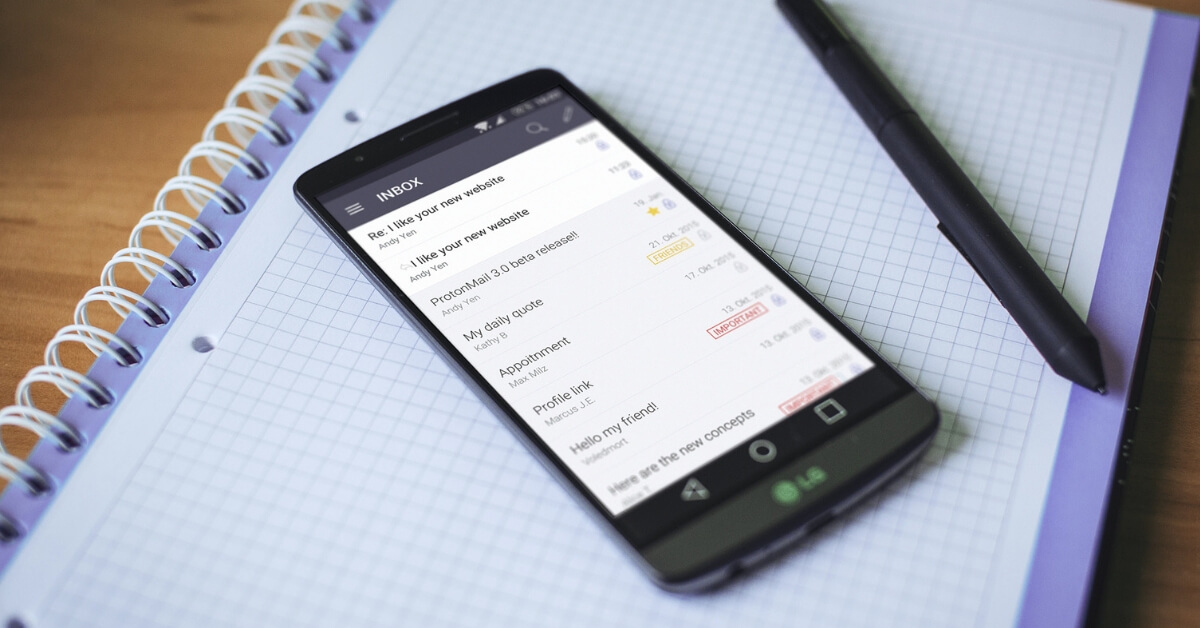Communication. It is one of the biggest reasons we, as a species, have been able to get this far. The ability to express and share obtained knowledge has lead to the elevation of the overall intelligence of primal societies.
Complex communication soon led to the development of glyphs, writings, and later letters. This way there was a possibility to share a piece of knowledge without the dependence on its carrier’s ability to recall it.
If we skip a few thousands of years, we have huge kingdoms that cover one-fifth of the whole world. Sending a letter from one part of the kingdom to the other took a long time, weeks if not months. If that letter was crucial to the kingdom’s survival there wasn’t only the need to deliver if fast, but also to deliver it safely.
It doesn’t matter if you’re a king who wants to recruit villagers for war or you’re just a citizen that wished to inform his family that he is finally earning money to provide food for them, you will want that information to stay private.
Many messengers were known to be tortured and even killed for the information they were supposed to deliver. Sending a letter became a threat to the messenger, so it became expensive to pay for protection and armed men to deliver the letter for you.
It’s 2019 and we still have that same problem; protecting the safety of the messages and emails we send. It is well known that, when using most email providers such as Gmail and Outlook that don’t have a good level of privacy, your email could easily be stolen at many points – only one of them is when your email gets sent from your device to the servers. Don’t think using regular postal service is any better, your letter can be stolen literally from the moment it’s out of your hands.
So what are you to do? What if you’re working on a secret project, if you’re a developer or if you want to mail sensitive information about your company? What if you just don’t want advertising companies to use your private communication to analyze your life?
Today I want to talk about a solution to all those problems. ProtonMail.
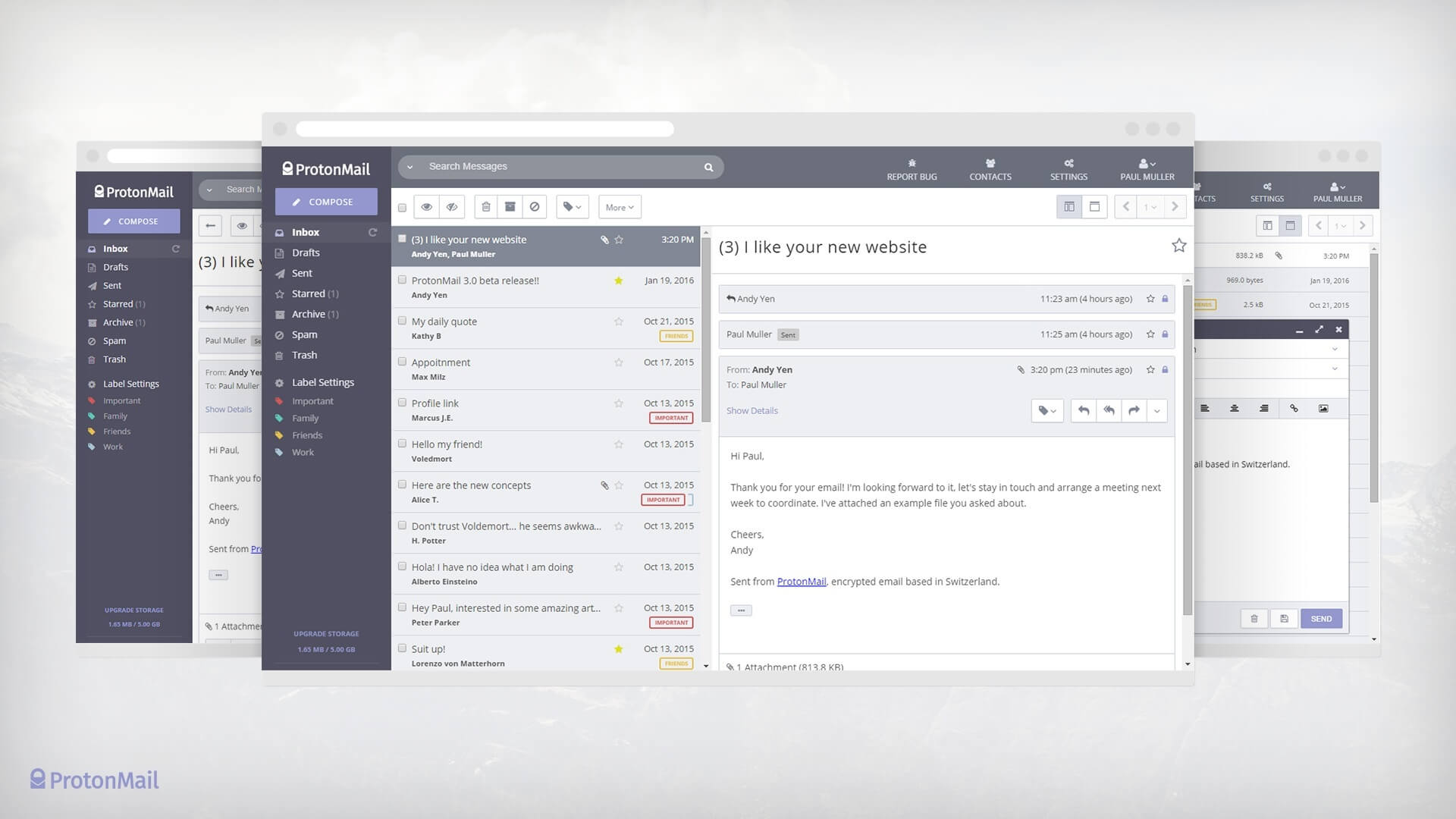
ProtonMail is an end-to-end encrypted email service provider founded five years ago at the CERN (European Organization for Nuclear Research or in French “Conseil Européen pour la Recherche Nucléaire”) by Andy Yen, Jason Stockman, and Wei Sun.
Upon the launch of its public beta on 16th May 2014 it was well received by so many that they had to suspend the beta signups until they expend the server capacity.
Initially, it was invitation-only but later ProtonMail opened up to the public in March 2016. To put it simply, ProtonMail is an email service provider that offers more secure communication over the internet and advanced file-sharing security features that are way ahead of the market leaders. Most of the people working for ProtonMail are highly educated intellectuals with degrees varying from Physics to Computer Science. One thing they have in common is their goal of making the internet a safe platform for sharing knowledge and to allow humanity to keep advancing with no restrictions and no fear.
The three people who started the idea of ProtonMail worked at CERN which is known for its research in subatomic particles, hence the name of the company ProtonMail.
ProtonMail is run by Proton Technologies, a company located in the Canton of Geneva, and its servers are located at two locations in Switzerland, which are outside of US and EU jurisdiction.
Now you’re thinking, “Why does it matter that the locations of the servers are outside of the United States and European Union jurisdiction?”.
In many cases around the world, those that we know of and those we don’t, a big threat to online privacy are governments and secret government organizations which can easily force your email service provider to give them your personal data without consulting your beforehand.
Google is a data company. All of that information they collect about you, including all of your receipts, newsletters, and conversations in Gmail could be used to alter your decisions through ads and commercials. It is even been proven that it’s possible to alter someone’s choice on who they are going to vote for in an election. And don’t think just using an adblocker is going to help you – not when recommended content is served based on your personal interests. Manipulation doesn’t have to come in the form of ad banners.
Using our own personal data to control us is nothing we ever agreed to – well…not directly anyway, but you haven’t read the license agreement before accepting it, have you?
Problems don’t end for you even if you’re running a business. Your main threat at this point are hackers and people who wish to see your business fall or to steal your data and ask for a ransom, which is a pretty common occurrence in small businesses.
It is also in your interest to keep your business secrets to yourself. Many businesses rely purely on emails, it would be catastrophic if their data leaked.

I mentioned that ProtonMail servers are in Switzerland. This means that all the data is protected and held by strict Swiss privacy protection laws. Switzerland is known for many things, from Swiss knives, watches, cheese, and banks. One thing to add to this list is the fact that Switzerland is not part of the European Union, allowing it to control their own privacy laws. This means that in case the European Union or the United States try to force someone into giving them access to their servers, they first need to get a green light from Switzerland which has much stricter privacy laws than the oppressive laws in the US and the EU.
In those two unions, gag orders can be issued to prevent a citizen from finding out that they are being investigated by the government organizations or under surveillance. These type of orders exist in Switzerland as well but the prosecutors must notify the person under surveillance about the action being taken as soon as possible, and that person has an opportunity to go to court and ask for compensation if it turns out that they were innocent.
Developers believe that maximum security can only be achieved by combining cryptographic and programming power with legal protections and laws. In this case, Switzerland provides an adequate combination of both IT infrastructure and such a legal environment that allows ProtonMail to deliver service that is both secure and reliable.
ProtonMail’s security measurements go beyond legal policies. Emails you send via ProtonMail are end-to-end encrypted (E2EE). This means that only you and the person you are talking to can read the messages. On the server, your messages are being stored in encrypted form and are distributed among the users as random strings of numbers and letters that would take a supercomputer hundred of years to decrypt. E2EE prevents potential eavesdroppers, internet providers, and even ProtonMail themselves from reading your messages. Yes, not even the owners of the company you’re using to send emails can read what you’re sending.
If you’re using some other email service provider your messages might get encrypted on the server by the main server key, but on their way to the server a hacker can easily read anything you’re sending as a plain text.
Since the main key is usually in the possession of the email service providers, they can easily read your data whenever they want to. This is where many companies pay your service provider to allow them access to your personal data so they can run targeted ads at you.
Imagine you’ve sent an email to your friend about how you want to buy a new mattress for your child’s room. You go to YouTube and there you are greeted by a mattress commercial. Coincidence? There is no such thing as a coincidence on this level. It’s all programmed to the point I can’t believe something like this even exists. This system is so easily abusable and almost every big company does it.
In the case of ProtonMail, not even the developers have the key your data was encrypted with.
One more thing I think is important to mention is that ProtonMail relies on open source cryptography. Open source means that the files regarding cryptography, in this case, are completely open to being seen by anyone who wishes to see it. This way the company can assure you that they don’t have any hidden, built-in back doors. That’s not to say that many parts of ProtonMail aren’t proprietary though. ProtonMail don’t let you see the source code for everything.
The level of security ProtonMail promises does not end there – you want your files to be protected both in the matter of software and hardware.
Even though it sounds funny, your data could easily be stolen like Austin Powers does in his movies, by walking inside the server room and connecting directly to the servers.
Not if your emails are saved on ProtonMail’s data centers which are located under 1000 meter of granite rock, in a place so heavily guarded that it could withstand a nuclear attack and still keep its integrity.
This makes sure that even if someone could somehow use your encrypted data that they wouldn’t be able to get it.
Additionally, ProtonMail does not log any of your information by default – unless you ask them to. They won’t record your IP address unless you turn the option on.
You can even choose to send self-destructing messages. Just like with Snapchat, once read, your messages will be deleted since they have a timer on them. Once expired, the message will not be readable by anyone. This option works not only between ProtonMail users but also with users of other email service providers.
In most cases when sending a message, the easiest way for a hacker to steal your data is to organize a MITM (Man in the middle) attack. This way a hacker acts to you as a server and to the actual server as you, giving him the access to the communications in between you and the server. With Swiss SSL this won’t be an issue because now there is another layer of protection to defend you from any kind of third-party activity.
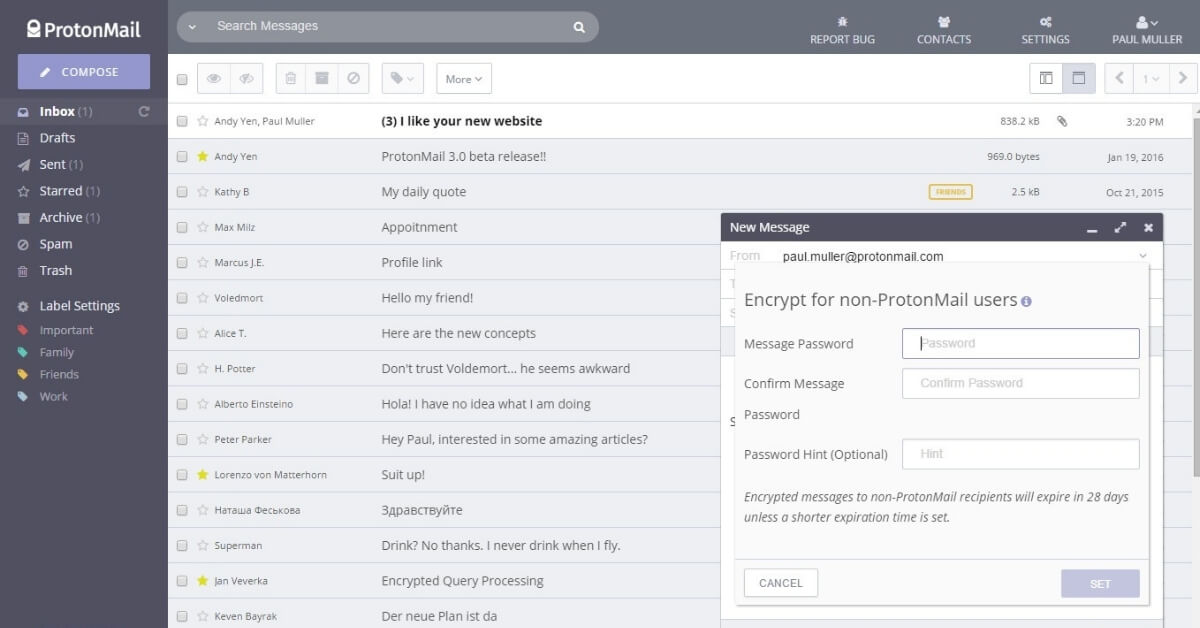
This massive barrier of security won’t prevent you from sending emails to non-ProtonMail users. You can still communicate safely even if they are using some other email service provider. You can also choose to send normal, non-encrypted emails if you think the data is not too important.
When choosing an email service, one of the biggest questions is, “With what device can I use it?”. ProtonMail is available on Android, iOS, PC, Mac, literally any device that has a browser such as Firefox, Chrome, Brave, etc.
With frequent updates, you won’t need to worry about bugs that usually make you question your decisions.
When it comes to using the ProtonMail on Android and iOS it is as smooth as one would expect from a regular, non-encrypted mailing service.
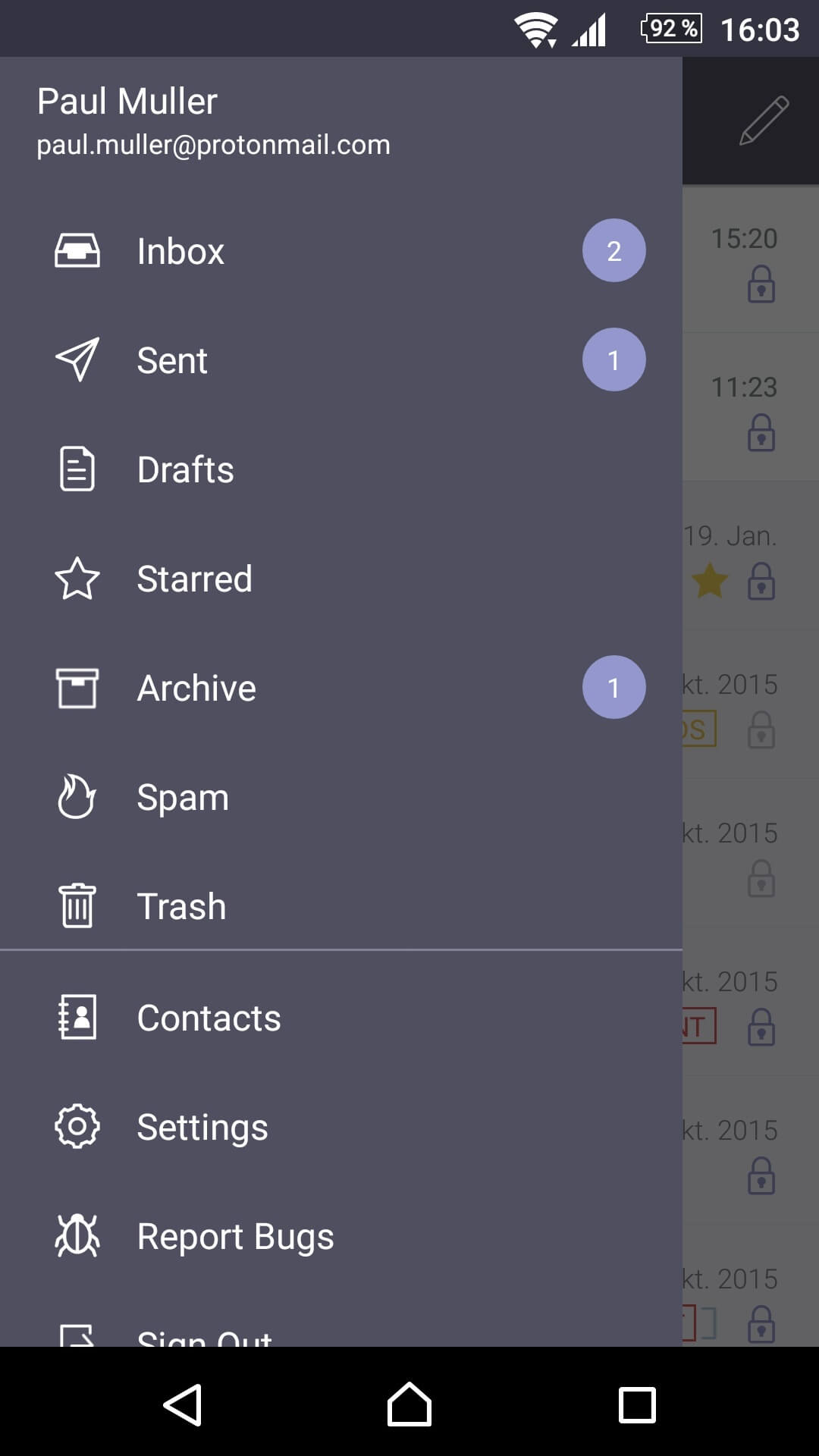
With all the usual settings like Inbox, Sent, Drafts, etc. to allow you a smooth transaction from other platforms to this one. The notifications and basically most of the other things are the same as on any other service, with minor adjustments to the actual layout. Both the iOS app and the Android app are regularly updated.
I’ve tried out many email service providers before and this one is not different in too many ways. It does have a look of its own that one gets accustomed to very fast.
When it comes to speed, the encryption itself does not have a noticeable impact on the timing. Once you tap or click the send button you can be sure that it won’t take long before your message reaches its destination.
I’ve tested the app in comparison to Outlook.com and the notification time was less than 30 seconds different. This means that you can use ProtonMail without much fear of your emails coming too late due to the encryption. Of course, if you are sending several documents you can expect the sending time to be slightly longer because it takes more time to encrypt all the data you’re going to send.
One thing that is remarkable is the idea of having such a powerful app without giving up on simplicity. If no one told you, you would never know that you are handling one of the safest ways to send an email in the world.
While its design resembles others, once you look under the production and user interface sheets, you will see the amount of engineering and clever thought that has been implemented to make something as simple as sending an email super safe.
That is also one of their policies. ProtonMail is not trying to force you to believe that they are the safest by implementing a complicated user interface aimed at pro users. What they are doing is they are allowing you full control over your files while still making it convenient even for the newest users. High security should not be paid by the ease of use. Yes, there are some ways to send emails in an even more secure way than ProtonMail – such as through PGP encryption with a desktop client but ProtonMail does it so you don’t have to go through seemingly never-ending grind just to send a secure email.
In most cases, when an app is free you will be bombarded by ads or the app will use some other ways of earning money such as aggregating your data. ProtonMail is supported by donations and premium paid accounts. All that money goes to further development of this service and to support activists and people who fight for change and against the evil corporations.
As mentioned before, ProtonMail has a few options you can choose when it comes to paying. You can always choose not to pay at all, and work as a free user but I’ll discuss the differences between several options.
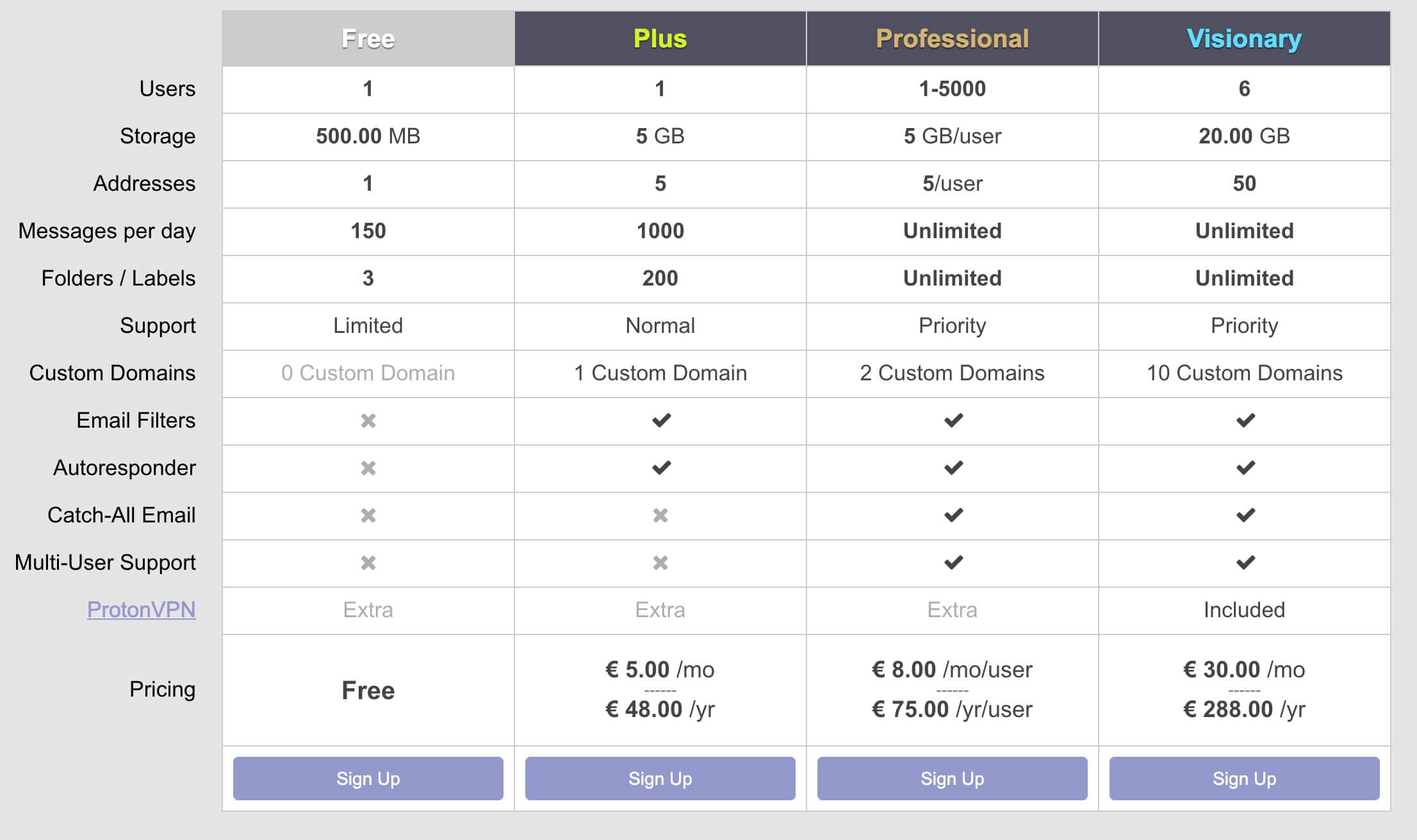
As a free user you will get:
- 1 user
- 1 address
- Half a gigabyte of storage
- 150 messages per day
- 3 Folders / Labels
- Limited support
This should be enough for almost any lite user that just wants a little privacy in this corrupted world.
The next option is called “Plus” and with it you get:
- 1 user
- 5 addresses
- 5 GB of storage
- 1000 messages per day
- 200 Folders / Labels
- Normal support
- 1 Custom Domain
- Email filters
- Autoresponder
This package will cost you € 5.00 /month or €48.00 / year
One step above is “Professional”
- 1 to 5000 users
- 5 addresses per user
- 5GB of storage per user
- Unlimited messages
- Unlimited folders
- Priority support
- 2 Custom Domains
- Email filters
- Autoresponder
- Catch-All Email
- Multi-User Support
This option will cost you 8 Euros a month for each user or 75 Euros a year per each user.
The ultimate deal on ProtonMail would be “Visionary”
- 6 users
- 50 addresses
- 20GB of storage
- Unlimited messages
- Unlimited folders
- Priority support
- 10 Custom domains
- Email filters
- Autoresponder
- Catch-All Email
- Multi-User Support
- An included ProtonVPN
ProtonVPN is a special product in the same lineup of products as ProtonMail. VPN or “Virtual Private Network” is your own tunnel of communication with the dedicated server that will completely defend you from any type of hacking attack.
This option is best suited for those who are pursuing activist goals and need every possible way to protect themselves from government and corporations.
It costs €30 a month or €288 a year. This may seem like a lot but it does include 6 users so if you’re a small business or you can get your family and friends on the plan to make up the 6 users, it ends up being the best overall deal.
There are additional ways to increase your storage, domain count and address count without going to a whole different package of services.
There are several reasons to chose to pay for ProtonMail, at least for additional storage. One of them being that ProtonMail is the largest secure email service that has millions of users and provides service which requires extensive work to be maintained.
So by buying a few gigabytes of extra storage, you’re actually supporting a bigger cause which is the fight for internet security. ProtonMail has many Ph.D. scientists and cryptography experts that actively work on a day-to-day basis to evolve the current systems and develop new ways of data protection.
In comparison to other email services, ProtonMail offers more than it takes. It might not seem so at first but when you realize that they are not selling your data, that they are not manipulating you in any way possible, they are just offering you to deliver your message to certain someone without even being able to read it. When you also consider that they have their servers in one of the safest places in the world, it’s easy to see how you’re getting a good deal.
If you haven’t heard about it before, there was a huge mess regarding the fact that Google kept saving the “location history” to your Gmail inbox and letting hundreds of firms access your inbox for their own benefit.
When using Gmail or Outlook, you aren’t really safe even when using advanced VPNs because your data still goes to your email where it’s not encrypted. Using VPNs is praised all across the community as a way to keep yourself safe when surfing the internet, but with such unsafe email providers, you can never be safe enough.
The thing that struck me the most with ProtonMail is the dedication to satisfy their customer requests. Besides the standard FAQ (Frequently Asked Questions) panel, there is also a live 24/7 hours customer support service which will kindly walk you through resolving even the most minor problems you could encounter.
You can also choose to send an email directly to the customer support, to which you will receive a pretty rapid response.
If you need help with the app or you need assistance with custom domains, the nice and kind people at the customer service will do their best to explain why you are seeing such a problem and how to solve it.
ProtonMail is originally created by scientists for scientists. They wanted to create a way to share their work without being spied on. This idea became huge once they saw how efficient and useful it actually is.
When you realize that the medical report you got from your hospital got seen by an entity other than you or your doctor, and that entity decided to sell that information to a pharmaceutical company so they can show ads for a specific disease, you will start asking yourself if this is really how bad things have gotten.
What ProtonMail is trying to achieve is bigger than just email servicing. ProtonMail is about protecting yourself and people around you, defending your own personality and who you are from corporations and governments who think that they own you.
ProtonMail could end up saving millions of dollars if they excluded the free version but profit is not what they are interested in, they have realized that the only way to break the wall is by removing the bricks from it.
The wall is the massive system build around us that focuses mainly on harnessing our individuality for its own benefit, and we are the bricks.
ProtonMail is sending a message that we can still fight for something greater. People like Edward Snowden are the ones who encourage you to protect your data because they have worked for groups that steal all that data from you. He knows the gravity of the situation and how important your personal information is. For that exact reason, many of those people have to live under the protection of some foreign countries where they know they won’t be assassinated. They literally gave their lives to protect yours. Best you can do to thank them is to try to protect yourself.

